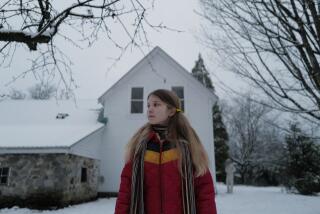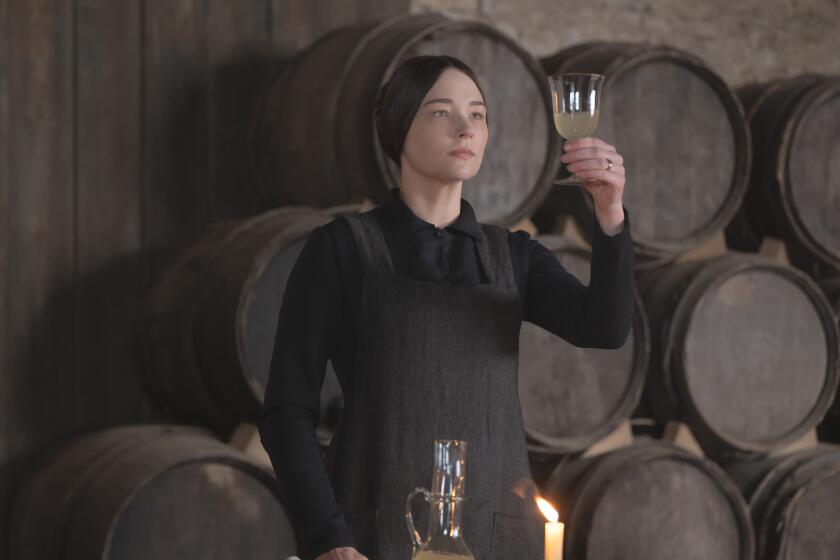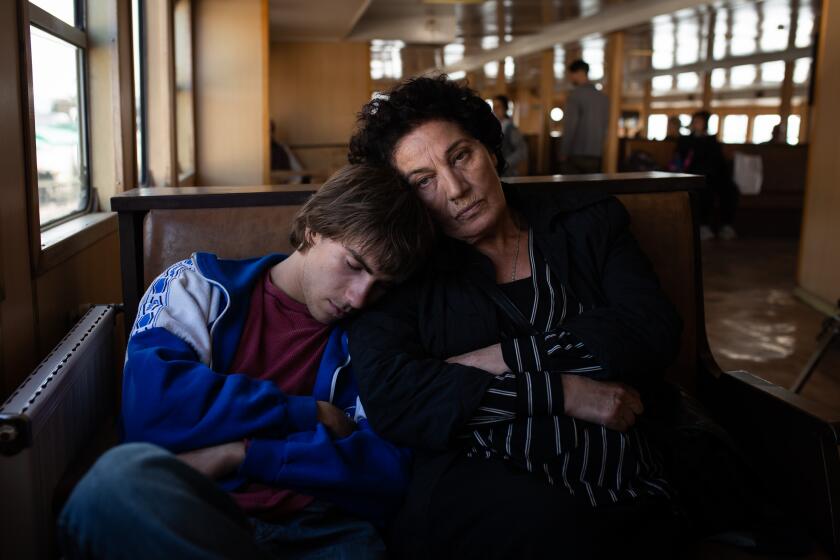Unlikely Bonds Bloom in Glowing ‘Spring’
Tom Gilroy’s debut feature, “Spring Forward,” is so fully realized and so moving that you wish you could get away with merely saying: “Go see it for yourself.”
Every frame attests to the power of simplicity. It affords Ned Beatty the role of a lifetime and an equally fine part for Liev Schreiber, who is swiftly emerging as one of the most accomplished actors of his generation. This modest, intimate film may be one of the last pictures to open in 2000, but it ranks among the year’s best, as do Beatty and Schreiber’s performances.
It begins deceptively, without any fanfare, as the camera picks up two men in work clothes riding in a pickup truck to a woodsy area. In time we learn that they are park and recreation department employees in an unnamed, enchantingly beautiful rural community--in reality, it is principally Ridgefield, Conn.
They pull up to a sizable house in the woods, where they are greeted by a preppy-looking young man of obvious influence: Fredrickson (Campbell Scott). There’s a suggestion that his family is in the nursery business; in any event, the young man has a substantial load of fertilizer to donate to the city and needs it moved immediately. But the two workmen he promised would be on hand to help Beatty’s Murph and Schreiber’s Paul have not shown up.
Fredrickson presumes that Murph and Paul will proceed with the unappealing task anyway, not even bothering to ask them whether or not they would mind doing so unassisted. Fredrickson’s casually condescending tone has ignited a slow burn in Paul from the get-go, and now he explodes at Fredrickson’s presumption.
From here, the movie could go lots of ways. Paul could turn violent, with Murph inadvertently winding up on the run with him--that would be the most predictable. But the steady, even-tempered Murph succeeds in calming Paul down. The younger man, suddenly ashamed of himself, runs off and gives way to sobbing, saying he’s got to quit on what is actually his first day on the job.
Paul is an ex-con, fresh out of prison, where he was sent for robbing a Dunkin’ Donuts to get funds he desperately needed to buy a car so he could hold down a job. He is filled with rage over the hard luck that has dogged him all his life but even more is dismayed at himself for failing to manage his anger, as he was taught in prison. Admitting he didn’t actually get the help he needed there, he has learned just enough to believe he should feel forever apologetic and impose upon himself rigid rules of behavior.
Murph has a better idea: that Paul ought to relax a little and try some self-acceptance. It is the birth of a friendship that makes this movie glow. In his 60s, Murph is old enough to have grown up in an era--the years following the Depression and World War II--when the old American tradition of lending a helping hand was intensified in one last gasp before receding in the wake of the postwar boom and all the wrenching socioeconomic changes since. Truly, Paul could have easily taken a hopelessly self-destructive course in his life, had Murph not happened to be there and actually cared what happened to him.
Murph and Paul learn about each other as they go about their jobs. Both had hard-drinking fathers, but Paul grew up in a poverty-stricken, broken home. Although a high school dropout, Paul is bright, curious and an autodidact with a susceptibility to New Age ideas that he at times carries to amusing lengths. Murph has learned to meet life philosophically, yet both admit to spiritual yearnings.
On one level, a father-son relationship develops between the men, but it is also a true friendship of equals in which innermost fears and joys are shared in an atmosphere of mutual trust. And as in all good friendships, theirs is not one-sided; indeed, Murph is as surprised as he is grateful for all that he learns from Paul.
Most significantly, “Spring Forward” is in no way the two-character play it could have been in lesser hands. Gilroy’s perspective runs wider and deeper than required just to depict the development of a bond between the two men, as affecting as it is.
At all times, Gilroy, a seasoned actor, stage director and playwright, exhibits a keen awareness of nature. The film’s settings and the outdoor work the characters do lend themselves to this concern, enabling Gilroy and his splendid cinematographer, Terry Stacey, to capture with subtlety the change of the seasons to evoke both the passing of time and the eternal cycle of life. This rich context lifts “Spring Forward” securely above the merely sentimental, delivering the fullest possible emotional impact.
Beatty and Schreiber become Murph and Paul to the extent that you forget they are actors giving performances. No moves, gestures, nuances or intonations suggest calculation, but rather complete naturalness, and this goes for the other actors in the cast: most important, Peri Gilpin as a likable young woman who gives Paul reason to hope he might not be so lonely in the future, and Catherine Kellner as a profoundly troubled young woman who evokes in Paul a response that reveals how thoroughly he has absorbed Murph’s exemplary kindness and concern for others.
“Spring Forward” leaves one with that rarest of feelings: a heightened awareness of the human capacity for good.
* MPAA rating: R, for language and some drug content. Times guidelines: some four-letter words aside, the film is suitable for older children.
‘Spring Forward’
Ned Beatty: Murph
Liev Schreiber: Paul
Peri Gilpin: Georgia
Catherine Kellner: Dawn
An IFC Films presentation. Writer-director Tom Gilroy. Producers Jim McKay, Gill Holland, Gilroy, Paul Mezey. Executive producers Jonathan Sehring, Caroline Kaplan, William Gilroy, Michael Stipe. Cinematographer Terry Stacey. Editor James Lyons. Music supervisor Julie Panebianco. Costumes Catherine Thomas. Production designer Susan Block. Art director Lucio Seixas. Running time: 1 hour, 52 minutes.
Exclusively at the Music Hall, 9036 Wilshire Blvd., Beverly Hills, (310) 274-6869; and the University 6, Campus Drive opposite UC Irvine, (949) 854-8811.
More to Read
Only good movies
Get the Indie Focus newsletter, Mark Olsen's weekly guide to the world of cinema.
You may occasionally receive promotional content from the Los Angeles Times.






